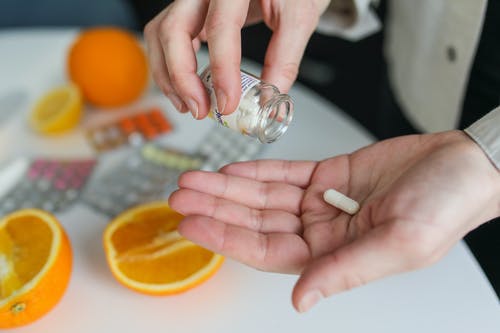
Deciding how to manage symptoms of hormonal imbalances and irregularities is something everyone eventually faces. It can be stressful to choose between pharmaceutical and non-pharmaceutical solutions, and the science is hard to organize.
With so much information available and your health at stake, you want to make the right decision. You need relief from your symptoms, but you also want to do what is best for your health. With a look at the current data, we hope to clear up some of the confusion about supplements versus hormone replacement therapy and help you have a basic understanding of your options and their impact on your health.
A supplement, taken by mouth, is meant to enhance a regular diet and can come in the form of a pill, powder, liquid, or energy-type bar. Supplements may contain vitamins, minerals, amino acids, enzymes, herbs, or other substances.
They are sold in regular grocery stores and do not require a prescription, but consulting with a doctor before starting a supplement is advisable. Supplements used for menopausal symptoms are not evaluated or proven safe by the FDA, whereas hormone replacement treatments have undergone FDA approval.
While soy is the most well-known supplement used for alleviating menopausal symptoms, which are brought on by imbalanced estrogen levels, many supplements are switching to yam-based products due to allergies. Phytoestrogens found in plants are much less potent than their prescription counterparts. There is no conclusive evidence to support that phytoestrogens increases the risk of breast cancer like estradiol, a synthetic estrogen, can. Flax, beans, lentils, and many other foods also contain phytoestrogens.
When comparing improvements in menopause symptoms with supplements versus hormone therapy, the data is conflicting. Some studies have shown promising results for yam supplements while others have shown no benefits. Supplementation may be the best choice for patients who prefer a more natural approach. A supportive doctor can offer suggestions and assistance if a patient wants to try supplements over hormone replacement therapy.
For hormone replacement therapy, Dr. Jacobson may prescribe any hormone necessary to treat a patient’s exact symptoms. He can determine whether a patient needs estrogen, progesterone, testosterone, thyroid hormone, or a combination of several hormones.
Hormone replacement therapy has been well studied and is effective at reducing symptoms of menopause, for example, as well as decreasing the risk of osteoporosis and heart disease. A trained doctor can help you decide which type of hormone replacement therapy is best for your situation.
Now that you know the basics of supplements versus hormone replacement therapy, the next step is meeting with a trained physician to help you decide how you want to proceed. Dr. Jacobson is available for consultations to determine what treatment plan is most suitable for you. Our goal is to respect your desires while safely improving your symptoms with research-based treatments. Call today to start easing your menopausal symptoms.